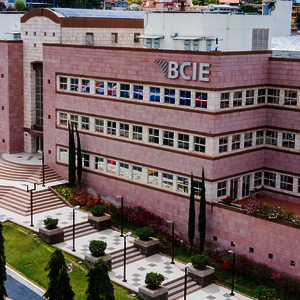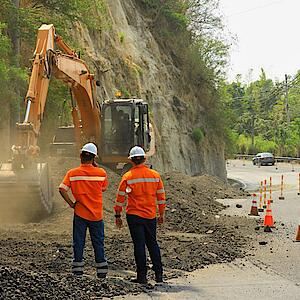CABEI commemorates World Health Day with investments of more than US$2 billion in the sector

• CABEI financing has made the rehabilitation, expansion and construction of hospital complexes possible in several countries in the region.
• In the face of the COVID-19 emergency, the Bank has demonstrated its strength in providing rapid and timely responses to its member countries.
Tegucigalpa, April 9th, 2021.- Committed to the wellbeing of Central Americans, the Central American Bank for Economic Integration (BCIE), on the occasion of World Health Day, shares some of the historic investments in this sector, which amount to US$2 billion.
In the case of Guatemala, the "Hospital Infrastructure and Equipment Investment Program" involves the design, construction and equipment, as well as the replacement and expansion of five national hospitals with an impact on 6.6 million inhabitants.
In Nicaragua, CABEI has granted approximately US$244.2 million in financing for four hospital projects in recent years, which has contributed to the modernization and expansion of the country's hospital infrastructure.
CABEI has approved three operations in this area for Costa Rica. In 2002, the "Integral Hospital Infrastructure Development Program" consisted of 28 investments in two national hospitals, three Integral Health Care Centers, and 23 Basic Integral Health Care Teams, with a total of 40,000 beneficiaries.
Also in Costa Rica, in 2013 the "Hospital Infrastructure and Equipment Renovation Program" intervened in three other national hospitals, benefiting 1.6 million people; while in January of this year, the "Regional Strengthening of Hospital Infrastructure Program" was approved, which involves investments in three national hospitals, impacting 830,243 people.
CABEI Executive President, Dr. Dante Mossi, stated that "the Bank is constantly seeking investment mechanisms in social infrastructure that guarantee Central Americans' accessibility to health care services in order to improve their quality of life.”
Since 2010, 82.9% of health approvals have gone to the sovereign public sector, 16.5% to the non-sovereign public sector and 0.6% to the private sector. In addition, 40% of historical approvals occurred between 2020 and the first months of 2021 as a response to its member countries' priorities to address the COVID-19 health crisis.
Dr. Mossi added that part of the funds were earmarked for immunization programs, which are not included as health investments, but are directly related to preventive health, such as care for Chagas disease, healthy schools, sports promotion, among others.
Pandemic Care Support
In addition to direct investments in health, CABEI has proven to be the Central American people's Bank, providing rapid and timely support in response to the COVID-19 emergency.
From March 2020 to date, the Bank has approved US$1.4 billion in projects related to economic reactivation and emergency measures to address the crisis through operations such as: financing compensatory economic measures, support to MIPYMEs and priority sectors, and Development Operations, directly related to policy support in response to COVID-19.
It also made US$800.0 million available to the 8 Central American Integration System (SICA) countries for the purchase and application of vaccines against COVID-19 through the Emergency COVID-19 Support and Preparedness and Economic Reactivation Program. Credit Facility.
On the other hand, in November 2020 CABEI became the first Multilateral Development Bank to issue a COVID-19 Vaccine Bond and then a second bond in December 2020, both in the Asian market, to raise a total amount of US$100 million from the capital markets.
Central American biotechnology cluster
Through the Republic of Korea, CABEI will support the creation of a biotechnology cluster to facilitate the supply of biotechnological and medical products and services, as well as the transfer of knowledge to the region in order to address the current pandemic and any future health crisis.
"We have to innovate in new areas of knowledge and production, so very soon we will be launching the regional initiative "Vaccine and Medicines Biopark" and we will define in which country will the first part of this regional production center be installed" indicated President Mossi.
Another of CABEI's proposals is to strengthen the scientific community's institutional framework. One of the Bank's financing projects consists of the Design, Construction and Equipment of the Gorgas Memorial Institute of Panama's facilities for a total of US$70.0 million, to provide it with new infrastructure and state-of-the-art technology.
Caring for their staff
CABEI, aware that its human capital is what makes it possible for the institution to move forward and impact the region, has enabled teleworking and monitors its employees' health condition since the beginning of the pandemic in 2020, as well as constant communication to provide them with biosecurity information on COVID-19.
In addition, a robust medical-hospital plan is part of the benefits that have made it one of the best places to work, according to its Great Place to Work certification.
CABEI considers the well-being of its employees and their families to be a strategic pillar, thus demonstrating its commitment to maintaining quality and safe employment.









